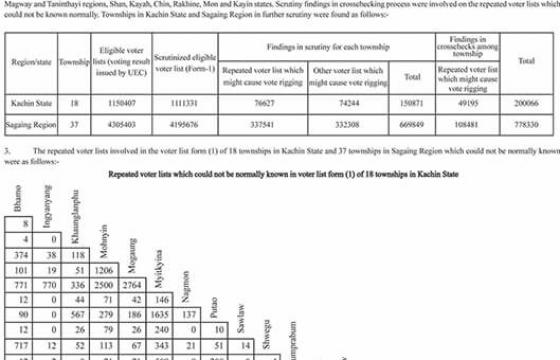In a surprise move, Lt-Gen Mya Tun Oo, the serving chief of Burma’s military intelligence, confirmed on 20 July that government soldiers were indeed responsible for the murder of five men from Mong Yaw in Lashio Township, northern Shan State.
Many wondered if the steadfast Burma Army’s denial mode for its nefarious behaviour is now starting to change, given the two highest profile gross human rights violations over the recent years remained unresolved and the culprits unpunished.
One is the October 2014 killing, while in military custody, of freelance journalist Ko Par Gyi, and the other, the deaths of two Kachin schoolteachers in northern Shan State in January last year that were widely alleged to have been perpetrated by Burma Army’s (Tatmadaw) soldiers.
Let us look into what might seem to look like the change of heart from the part of Tatmadaw, and if this is a new start to become a standard army or genuine union army, taking orders from the civilian government, rather than positioning itself as “a state within a state”.
How it happened
Seven Mong Yaw villagers were reportedly killed by the Burma Army late last month. According to eyewitnesses, five were arrested by a unit of Burmese government forces on June 25, and later found buried in shallow graves near an army camp. The other two were shot dead that same day when they failed to stop their motorbike at an army checkpoint in the town.
While Mya Tun Oo said the Burmese soldiers were responsibly for the death of the five, the responsibility for the two others, who were shot down from their motorcycle were somewhat not clear and still need to investigate for clarity.
He would concede only the possibility that it was Tatmadaw bullets that killed the men, indicating an equal likelihood that an ethnic armed group could also be responsible.
During the press conference on 20 July, he said: “They drove their motorbike into the fighting zone,” asserting that the two had entered an area of active conflict between the Tatmadaw and an unspecified ethnic armed group.
“We don’t know whose bullets they were shot by. We found their dead bodies. And also found them [in possession] of drugs. We still don’t know who they are. We will certainly investigate.”
The Shan Human Rights Foundation, however, has already conducted its own investigation into the incidents, identifying the two victims on the motorbike as brothers Sai Naw Tint and Sai Hla, fathers of two and three children, respectively.
Their badly decomposed bodies were found in a ditch beside the road on which they were shot on June 29, four days after the incident, according to SHRF’s report, which cited testimony from the two men’s uncle.
The shooting occurred on June 25, the report said, when Tatmadaw Light Infantry Battalion 362 set up a blockade of the road linking Mong Yaw village to Lashio town. Based on testimonies from other motorists pulled over, the SHRF said Tatmadaw troops ordered the men to stop but they did not heed those calls, prompting gunfire from soldiers in the battalion first into the air and then at the men, killing them both.
“I heard the military tried to stop them, but they didn’t stop. There are witnesses that say the military shot them,” Nan Shwe Yone, said a resident of Mong Yaw, corroborating SHRF’s report.
“The court martial found that they [soldiers] violated the rules, and failed to follow certain procedures that led to the death of the victims during interrogation,” Lt-Gen Mya Tun Oo admitted at a public news conference in Rangoon.
He said a court martial was in progress, and that the verdict would be made open to the public.
Public uproar after the killings
Following the tragic incident, on 4 July, five Shan Civil Society Organizations – Tai Youth Network, Tai Youth Organization, Kachin Youth Organization, Ta’ang Women Organization, Ta’ang Students and Youth Organization – issued a statement, condemning the killings, cautioned that it could derail the 21st Century Panglong Conference and demanded the speedy investigation, bringing justice to the case.
On 15 July, Nang San San Aye, a Shan Nationalities League for Democracy MP representing Hsipaw township, put forward the urgent proposal addressing both the Shan State and also the Union governments to stop all the wars as soon as possible, mediating as a go-between among warring parties and help mapped out to avoid future conflicts.
The tabled proposed motion, during the fourth session of the state legislature was submitted a day earlier, which the state border and security affairs minister Colonel Soe Moe Aung, on July 15, advised Shan State lawmakers to put the proposal on record, a less forceful parliamentary motion, but MPs anyhow voted on it.
The motion was approved with a wide margin approval of 76 votes to 57 rejection votes, which were military appointed MPs. The huge success was due to the fact that all Shan State citizens MPs, regardless of political affiliation, all voted for the anti-war urgent resolution, according to Nang San San Aye.
Simultaneously, on 16 July, more than 1,000 protesters held a rally in Lashio town demanding an end to the killing of innocent civilians.
According to Sai Pha Seng, who was present at the event, the demonstration started at 9am, and included participants from Lashio, Kutkhai, Hsenwi, Tangyan, Mongyai, Kyaukme and Hsipaw townships, The peaceful protest was conducted through the streets of Lashio city.
“Innocent civilians have been killed arbitrarily, but no group is taking responsibility,” he said. “The Tatmadaw and ethnic armed groups must work together through the peace process and show respect for human rights.”
Earlier, the civil society organizations leading the rally had also demanded the National League for Democracy (NLD) regime to lead the investigation and bring the culprits to justice.
Dim prospects
This brings us back to the point if the Tatmadaw is becoming enlightened and is determined to strive for a standard or professional army, going back to the barracks where it really belongs to and taking orders from a democratically elected, civilian government.
But seen from the point of a well-known rights group, the government and the military might need to do more, if such incidents are to be avoided and handled in a proper way.
In a statement on July 20, Amnesty International urged the NLD-led government to take action against those who were involved in the incident.
“While it’s positive that the authorities are investigating this case, the reality is that all too often victims and their families are denied access to justice, truth and reparations, and have faced reprisals when reporting cases of military abuse. This has to stop and Myanmar’s [Burma’s] new government must make it clear that no one is above the law,” said Rafendi Djamin, Amnesty’s director for Southeast Asia and the Pacific.
“This case is an important reminder of the need to reform the military and judicial systems in Myanmar,” he added. “Although it is important that steps are taken to ensure those responsible for serious human rights violations are held to account, military tribunals are not the solution. The authorities in Myanmar must take immediate action to ensure that human rights violators can be effectively tried before independent, civilian courts – anything less would only serve to perpetuate the cycle of impunity.”
Apart from this, the Burma Army’s indoctrination of its soldiers’ mindset to hate and treated the ethnic population as enemies, as they are supporters of the ethnic armies, must be changed through detoxification program, leading to a more humane, standard army behaviour that is in line with a democratic state. Of course, this also has to be coupled with the promulgation of enforcement law and harsh punishment for perpetrators in committing such extra-judicial killings of innocent civilians.
Furthermore, the Tatmadaw would need to cater to “The Geneva Conventions and the Additional Protocols-Basic Rules” that emphasizes the “Basic rules of international humanitarian law in armed conflicts”, where those who do not take a direct part in hostilities are entitled to respect for their lives and their moral and physical integrity and they shall in all circumstances be protected and treated humanely without any adverse distinction; forbidden to kill or injure an enemy who surrenders or who is hors de combat; among others.
According to Wikipedia, person is “hors de combat” if: (a) he is in the power of an adverse Party; (b) he clearly expresses an intention to surrender; or (c) he has been rendered unconscious or is otherwise incapacitated by wounds or sickness, and therefore is incapable of defending himself; provided that in any of these cases he abstains from any hostile act and does not attempt to escape.
And the poor innocent villagers were not even running away, but killed under interrogation and torture. Hundreds of such victims could be counted, if one cares to go through the human rights abuses documentation, gathered by reputed rights organizations like Amnesty International, Human Rights Watch and United Nations Human Rights Council, during this decades-long and ongoing war of ethnic conflict.
The Shan State parliament restoring peace and anti-war resolution won’t be able to do anything concrete on the ground, so long as the military is not onboard and political settlement still out of reach, as the rejection of the military MPs have shown during the urgent proposal to stop the war voting on 15 July.
As such, it is quite clear that only the about turn policy of the military from war-like posture to peaceful settlement, coupled with the absence of war, doing away with the human rights abuses and finally returning to the barracks, would be able to resolve this continuous and lingering crime against humanity, not before all these conditions are met or have taken place.






